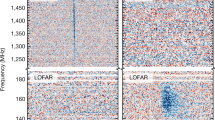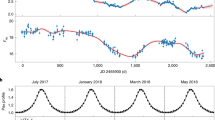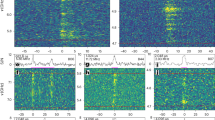Abstract
COSMIC or galactic noise was discovered by Jansky1 in 1931 ; but its exact origin has remained uncertain. It is generally supposed to originate from collisions in interstellar matter2; but there are divergencies between existing theory and experimental results, particularly at lower radio frequencies3. Hey, Parsons and Phillips4 discovered variations in the intensity of galactic noise from the direction of the constellation of Cygnus, with a period of about one minute—suggesting that this particular radiation has its origin in a discrete source.
This is a preview of subscription content, access via your institution
Access options
Subscribe to this journal
Receive 51 print issues and online access
$199.00 per year
only $3.90 per issue
Buy this article
- Purchase on Springer Link
- Instant access to full article PDF
Prices may be subject to local taxes which are calculated during checkout
Similar content being viewed by others
References
Proc. Inst. Radio Eng., 20, 1920 (1932).
Astrophys. J., 91, 625 (1940).
Astrophys. J., 105, 235 (1947).
Nature, 158, 234 (1946).
Nature, 157, 158 (1946).
Nature, 157, 297 (1946).
Nature, 158, 758 (1946).
Nature, 159, 26 (1947).
Author information
Authors and Affiliations
Rights and permissions
About this article
Cite this article
BOLTON, J., STANLEY, G. Variable Source of Radio Frequency Radiation in the Constellation of Cygnus. Nature 161, 312–313 (1948). https://doi.org/10.1038/161312b0
Issue Date:
DOI: https://doi.org/10.1038/161312b0
This article is cited by
-
Extragalactic radio continuum surveys and the transformation of radio astronomy
Nature Astronomy (2017)
Comments
By submitting a comment you agree to abide by our Terms and Community Guidelines. If you find something abusive or that does not comply with our terms or guidelines please flag it as inappropriate.



